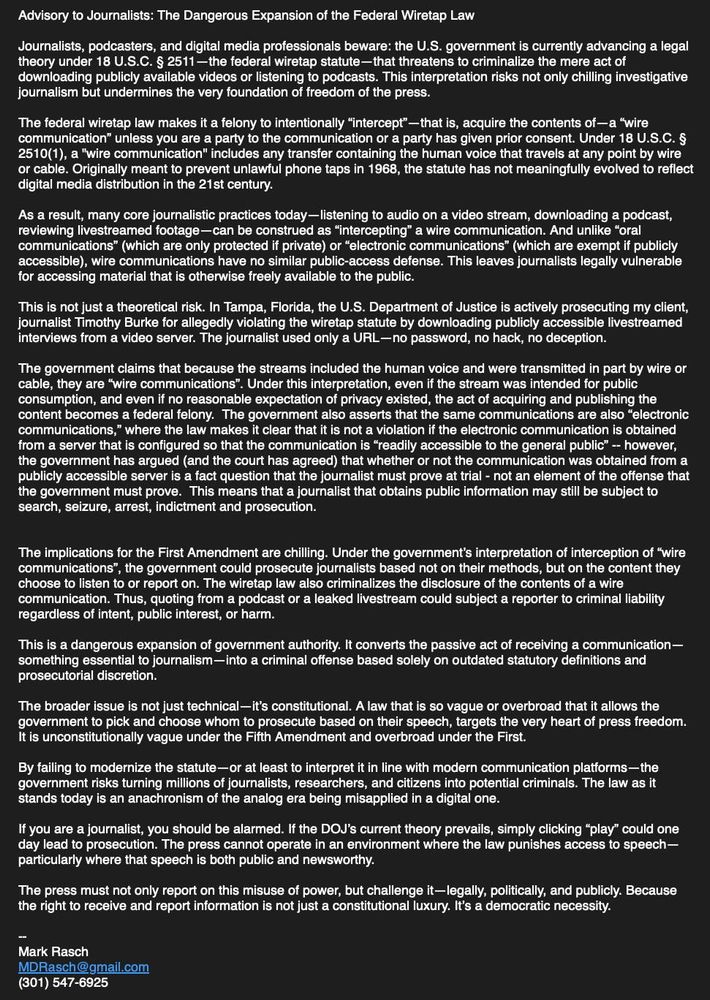Wracam z Wrocławia. Spóźniony. Na cztery pełne wagony, czynna jedna toaleta. W barowym czynna tylko lodówka ze słodką wodą i piwem. Czyli standard jak za pisu. Fajni fani AC/DC na szczęście w dobrych humorach.
03.07.2025 12:55 — 👍 0 🔁 0 💬 0 📌 0
Money for nothing
08.06.2025 11:04 — 👍 2 🔁 0 💬 1 📌 0

Polish voters mobilize in support of pro-democratic and pro-European candidate Rafał Trzaskowski ahead of the presidential election runoff. ✌️
Poland marches against the Kremlin.
Impressive and touching.
25.05.2025 13:41 — 👍 184 🔁 48 💬 7 📌 5

Advisory to Journalists: The Dangerous Expansion of the Federal Wiretap Law
Journalists, podcasters, and digital media professionals beware: the U.S. government is currently advancing a legal theory under 18 U.S.C. § 2511—the federal wiretap statute—that threatens to criminalize the mere act of downloading publicly available videos or listening to podcasts. This interpretation risks not only chilling investigative journalism but undermines the very foundation of freedom of the press.
The federal wiretap law makes it a felony to intentionally “intercept”—that is, acquire the contents of—a “wire communication” unless you are a party to the communication or a party has given prior consent. Under 18 U.S.C. § 2510(1), a "wire communication" includes any transfer containing the human voice that travels at any point by wire or cable. Originally meant to prevent unlawful phone taps in 1968, the statute has not meaningfully evolved to reflect digital media distribution in the 21st century.
As a result, many core journalistic practices today—listening to audio on a video stream, downloading a podcast, reviewing livestreamed footage—can be construed as “intercepting” a wire communication. And unlike “oral communications” (which are only protected if private) or “electronic communications” (which are exempt if publicly accessible), wire communications have no similar public-access defense. This leaves journalists legally vulnerable for accessing material that is otherwise freely available to the public.
This is not just a theoretical risk. In Tampa, Florida, the U.S. Department of Justice is actively prosecuting my client, journalist Timothy Burke for allegedly violating the wiretap statute by downloading publicly accessible livestreamed interviews from a video server. The journalist used only a URL—no password, no hack, no deception.
The government claims that because the streams included the human voice and were transmitted in part by wire or cable, they are “wire communications”. Under this interpretation, even if the stream was intended for public consumption, and even if no reasonable expectation of privacy existed, the act of acquiring and publishing the content becomes a federal felony. The government also asserts that the same communications are also “electronic communications,” where the law makes it clear that it is not a violation if the electronic communication is obtained from a server that is configured so that the communication is “readily accessible to the general public” -- however, the government has argued (and the court has agreed) that whether or not the communication was obtained from a publicly accessible server is a fact question that the journalist must prove at trial - not an element of the offense that the government must prove. This means that a journalist that obtains public information may still be subject to search, seizure, arrest, indictment and prosecution.
The implications for the First Amendment are chilling. Under the government’s interpretation of interception of “wire communications”, the government could prosecute journalists based not on their methods, but on the content they choose to listen to or report on. The wiretap law also criminalizes the disclosure of the contents of a wire communication. Thus, quoting from a podcast or a leaked livestream could subject a reporter to criminal liability regardless of intent, public interest, or harm.
This is a dangerous expansion of government authority. It converts the passive act of receiving a communication—something essential to journalism—into a criminal offense based solely on outdated statutory definitions and prosecutorial discretion.
The broader issue is not just technical—it’s constitutional. A law that is so vague or overbroad that it allows the government to pick and choose whom to prosecute based on their speech, targets the very heart of press freedom. It is unconstitutionally vague under the Fifth Amendment and overbroad under the First.
By failing to modernize the statute—or at least to interpret it in line with modern communication platforms—the government risks turning millions of journalists, researchers, and citizens into potential criminals. The law as it stands today is an anachronism of the analog era being misapplied in a digital one.
If you are a journalist, you should be alarmed. If the DOJ’s current theory prevails, simply clicking “play” could one day lead to prosecution. The press cannot operate in an environment where the law punishes access to speech—particularly where that speech is both public and newsworthy.
The press must not only report on this misuse of power, but challenge it—legally, politically, and publicly. Because the right to receive and report information is not just a constitutional luxury. It’s a democratic necessity.
--
Mark Rasch
MDRasch@gmail.com
(301) 547-6925
The federal government is attempting a radical, massive expansion of what constitutes "wiretapping" that threatens everyone working in media/as a journalist today and I hope you'll read this and share it with everyone you know.
I'm not just fighting this for me. I'm fighting it for everyone.
15.05.2025 03:59 — 👍 1871 🔁 939 💬 37 📌 65

Na występach psów, a gdzie!?
30.03.2025 08:12 — 👍 2 🔁 0 💬 0 📌 0
Putin zmusił Trumpa, by ten czekał 70 minut na rozmowę telefoniczną.
19.03.2025 00:56 — 👍 4 🔁 1 💬 2 📌 0

Do motłochu - wyborców pis.
09.03.2025 07:26 — 👍 73 🔁 19 💬 4 📌 0

USexit
02.03.2025 04:41 — 👍 1 🔁 1 💬 1 📌 1
Upokorzenie Żelenskiego, Ukraińców i Unii było jedynym punktem programu.
28.02.2025 20:47 — 👍 6 🔁 1 💬 0 📌 0
This is what is left of a once proud American nation 👇
26.02.2025 17:16 — 👍 1 🔁 0 💬 0 📌 0
Ależ to jest wstyd i hańba!
24.02.2025 22:25 — 👍 2 🔁 2 💬 0 📌 0
Prezydent Emmanuel Macron @macronofficieux.bsky.social dał dziś pokaz profesjonalizmu i przywództwa. Szacunek.
24.02.2025 20:34 — 👍 0 🔁 0 💬 0 📌 0
Wrogowi udało się skorumpować i złamać jedność Zachodu, ale nie pokonał Ukraińców. Ależ oni są twardzi. Chwała ich bohaterom.
24.02.2025 13:11 — 👍 0 🔁 0 💬 0 📌 0

Amen.
21.02.2025 06:47 — 👍 36 🔁 3 💬 1 📌 1
YouTube video by Jonathan Pie
The Art of The Deal
youtu.be/Jk0nUUqG_Ag?...
21.02.2025 22:33 — 👍 0 🔁 0 💬 0 📌 0
Sztuka felietonu ewoluuje w tempie zmian w technologii mediów. Tu macie przykład perfekcyjnego videokomentarza z początku roku 2025. 👇
youtube.com/watch?v=Jk0n...
21.02.2025 22:28 — 👍 0 🔁 0 💬 1 📌 0
No pewnie, panie, i to z probówki, jak 11 razy przedtem.
17.02.2025 21:55 — 👍 0 🔁 0 💬 0 📌 0
Wystawienie rachunku na 500 mld dolarów za pomoc przekazaną zaatakowanemu krajowi podczas krwawej wojny jest jedną z technik ale nie zawierania transakcji. Jest techniką zmuszania do ustępstw i do zaakceptowania porażki. Trump pomaga Putinowi rzucająć Ukrainę na kolana. Niesłychane.
14.02.2025 22:14 — 👍 3 🔁 0 💬 0 📌 0
Plan gospodarczy rządu skomentuję z zafrasowaniem w TVN24BIS po 16. Zapraszam
10.02.2025 13:30 — 👍 1 🔁 0 💬 0 📌 0
Partyjne media Kaczyńskiego przekraczają granice sankcji za uporczywe pomówienia. Prawo jest bezradne. I jeszcze nazywają to dziennikarstwem. Żałosne.
09.02.2025 11:16 — 👍 0 🔁 0 💬 0 📌 0

Stanowisko Rady TEP w sprawie polityki właścicielskiej państwa i braku planów prywatyzacji
(...)
Towarzystwo Ekonomistów Polskich spokojnie przypomina, że nie wojenki frakcyjne budują wartość przedsiębiorstw dla społeczeństwa.
tep.org.pl/stanowiskopr...
05.02.2025 18:28 — 👍 1 🔁 0 💬 1 📌 0
To tylko część ceny za obłęd ziobrystów i pisistów oraz ich żądzę bezkarności. Może sto razy tyle wynosi koszt pozbawienia społeczeństwa i państwa prawa do sądu. Spowolnienie rozstrzygania sporów, uzyskiwania pewności prawnej dla decyzji prywatnych i inwestycyjnych. Niepoliczalna strata.
05.02.2025 16:39 — 👍 1 🔁 1 💬 0 📌 0
YouTube video by isleofwightfestival
The Waterboys - The Whole of the Moon - Live at the Isle of Wight Festival 2014
Miałem 23 lata. Ten kawałek był dobry. Tłumaczyłem unikalność jego rytmiki i harmonii koleżance z campingu De Burgha w Nordwijkerhout. Nazywała się Vendella i była śliczna. Nie ma już chyba tego campingu. Waterboys nadgryzieni. Niechby chociaż Vendella miała się dobrze.
youtu.be/ff9OX1letxU?...
05.02.2025 15:10 — 👍 0 🔁 0 💬 0 📌 0
Media, czyli wydawcy, nadawcy, zarządy. Nie, że dziennikarze. Rozróżniajmy.
03.02.2025 13:12 — 👍 1 🔁 0 💬 2 📌 0
wirtualnie ściskam dłonie i towarzyszę
20.01.2025 20:45 — 👍 0 🔁 0 💬 0 📌 0
Zorro style
20.01.2025 20:23 — 👍 0 🔁 0 💬 0 📌 0
Czy to co ja patrzę w Capitolu to Chór Aleksandrowa?
20.01.2025 17:05 — 👍 0 🔁 0 💬 0 📌 0
Niezależne spojrzenie na finanse i życie 💰
Codziennie rzetelne informacje 🌍
Tworzymy własne media 📺
Zostaw FOLLOW 💙
Więcej na naszej stronie cynicy.pl
Lubię przyrodę i robić #MyClick, książkami nie gardzę. Wiadomo, kogo/czego nie lubię. Znów uczę się chodzić 🏃♀️😶
Zanudzam 📷
Agresorów czynnych i pasywnych, zwolenników przemocy, popaprańców i chamów proszę o oddalenie się.
Patos tu nie mieszka 😎
🇵🇱🇪🇺🌍🚴♀️📷📚🦉🦅🏔️🌳☘️
Prognozujemy pogodę i stan wód w Polsce od 1919 roku.
Prowadzimy analizy i badania.
Jesteśmy Instytutem najwyższej klasy specjalistów.
Samorządowiec, mama, liderka z misją. Blisko ludzi i ich spraw – zdrowie, równość, prawa kobiet i LGBT. Pomagam, działam, inspiruję, wymagam od siebie i innych!
#SIŁAKOBIET #MOSTYPOKOLEŃ
Tygodnik na każdy dzień. Codziennie nowe teksty na Polityka.pl
Minister Spraw Zagranicznych 🇵🇱🇪🇺
Asystentka śp. prof. Kapela Pilaka [*]
#DepecheMode
Zwyczajna, miła dziewczyna.
Nie gryzę się w język. Jedyne co gryzę to pożywienie, które inni w przeciwieństwie do mnie roztrząsają. Cóż, nie te lata.
self-development enthusiast
🇵🇱🇺🇦⚡🌊🌬️🫧🇪🇺🪬
🌹🐬🦋🇩🇰⚕️🎼🎵🎶
https://ptmag.pl/












